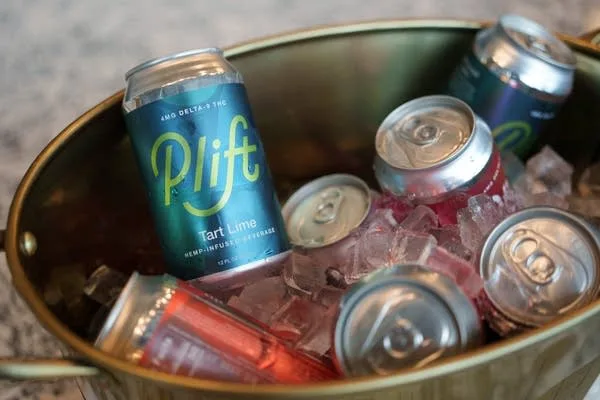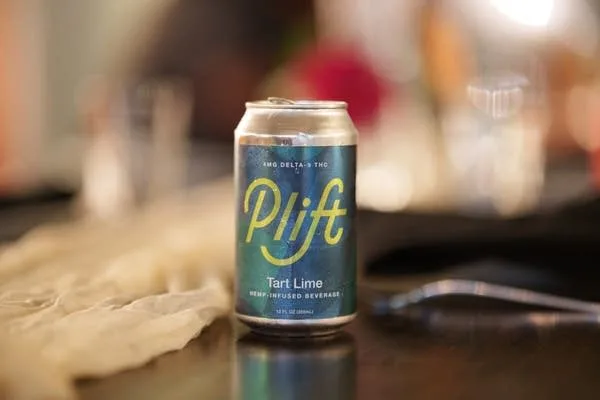Many places you go these days, liquor stores, co-ops and even convenience stores, you see them: colorful cans of CBD and THC drinks, recently legal to sell and consume in Minnesota.
And when happy hour comes around, I often finding myself reaching for one of them instead of a glass of wine. Unlike with alcohol, there’s no hangover, I sleep better, and feel great in the morning after a couple of these.

Cans of Plift, a hemp-infused beverage, rest in ice during celebration dinner for the company in Minneapolis on July 19.
Tim Evans for MPR News
When I heard that Plift hemp-infused beverages was a Black owned-and-operated company, I started asking for it by name. You can get it in stores around Minnesota as well as five other states, and soon to be in Wisconsin.
Plift hemp-infused beverages come in a variety of fun flavors. There’s juicy grapefruit and crisp ginger that taste a bit like natural soda. Guests at a recent dinner party reacted as they took their first sips.
MPR News is supported by Members. Gifts from individuals power everything you find here. Make a gift of any amount today to become a Member!
“I don’t know what it is but I thought it was going to taste more like sparkling water, but it tastes more like pop,” said one guest.
Another guest had fun saying the name aloud and then gave his verdict: “It’s a pretty good beverage. I’d give it …” He paused to take another taste. “A nine. It’s not bad. I don’t want to go too crazy with the rating. It’s good though. I like it!”




Jade Jones (right) enjoys a can of Plift, a hemp-infused beverage, during a dinner celebration for Plift in Minneapolis on July 19.
Tim Evans for MPR News
Plift also contains four milligrams of THC per can which offers a light buzz. This relatively small amount of cannabinoids, the psychoactive compounds in cannabis. Co-owner Todd Harris calls it “sessionable.”
It’s a brewing term for an alcoholic beverage that is light, refreshing and easy to drink, without too much inebriating effect.
But unlike sessionable beer, there is no alcohol in the making of Plift.
“I grew up in a family where my parents were amazing parents,” says Harris, who was born and grew up in Minneapolis. “But alcohol was prevalent. And so I quickly realized that I was always one drink away from being an alcoholic myself, as well as how alcohol played a role in communities of color. And so I said, ‘Let’s go build a really good product that provides optionality for those who want ways to unwind that don’t include alcohol.’”




Plift co-founder and CEO Todd Harris speaks to attendees during the July 19 dinner celebration in Minneapolis as co-founder Glenn McElfresh (left) looks on.
Tim Evans for MPR News
‘Easier to get alcohol than a square meal’
The negative impact of alcohol on communities of color, and in particular the Black community, is well-documented.
According to the American Psychological Association, African Americans drink less, start drinking later and abuse alcohol less frequently than other races and cultures. However Black people suffer from more negative consequences of alcohol use, including more injuries and illnesses. More potent forms of alcohol, such as malt liquor and 40oz beers have historically been marketed disproportionately to Black communities.
“In communities of color,” Harris goes on, “it’s easier for people to get their hands on alcohol and poison than it is to get their hands on a square meal.”
So he and his partner Glenn McElfresh, both fans of cannabis, decide to make what they think of as a “viable alternative” to alcohol, one arguably with fewer negative consequences.
“And if we can make it at a price point that becomes affordable and accessible and approachable, then that’s even better,” Harris adds.
Social justice issue
The duo really think of their product, and cannabis in general, as a social justice issue, and very one that is currently super topical with the shifting marijuana legislation nationwide. This includes Minnesota’s recent legalization of recreational use for people aged 21 and above.
Plift decided early on that its active ingredient would come from hemp, and Harris says he has no intention of moving into marijuana. But he’s watching the changing market forces in Minnesota.
Historically, Black people have received the short end of the stick where it comes to marijuana use in the legal system. Black people outnumber white people four-to-one in marijuana arrests according to NORML, the National Organization for the Reform of Marijuana Laws.
And, says Harris, just because marijuana is legal here and in other states around the country, it doesn’t mean Black people are suddenly poised to win in the marketplace. In fact, Harris predicts quite the opposite.
“You’re going to see scarcity of Black founders,” he said. “You’re going to see the literal gentrification of cannabis.”
Currently, Black ownership makes up less than two percent in the cannabis industry, according to a 2021 jobs report in Leafly, one of the leading sources on cannabis use and education. Plift is one of just a handful of Black-owned cannabis companies in the state of Minnesota. It is currently producing about one thousand cases of product per week, but say it is growing quickly.




Plift co-founder and CEO Todd Harris mingles with Nels Paulson during a dinner celebration for the company in Minneapolis July 19.
Tim Evans for MPR News
Worry for the future
Harris said they are cautiously optimistic about their position in the marketplace. Because of its much lower barriers to entry and the fact that it’s already a federally legal substance, Harris and McElfresh decided to derive their cannabinoids from hemp.
Thanks to that lower barrier to entry — about $1,000 for a license compared to tens of thousands for a marijuana license — about 60 sixty percent of the hemp companies in the state are owned by minorities or women, according to a study by the Minnesota Cannabis Association.
But Harris worries Plift’s decision to go with hemp might ultimately put their company at a disadvantage.
“Corporate cannabis companies want to have a monopoly on the marketplace,” Harris explains. “And low potency THC from hemp competes directly with both medical and recreational marijuana derived THC products.”
Harris said special interest groups are currently lobbying to restrict access to hemp for companies like his, and there’s one reason for that: the big operations want to corner the market.
“I think the fact that in 2023 we still have people who look like me locked up for things that many, many people are getting very wealthy on — mainly middle aged white men — is a travesty. And it’s just another instance in how policy politics in our systems continue to fail Black people and Black men in general.”
Harris worries that as marijuana continues to be legalized around the country, people of color will not benefit at large. This despite legislative calls to create opportunities for the communities most adversely affected by the war on drugs to benefit from the opportunities offered by business possibilities created by marijuana legalization.
“There’s not a good example in the country, yet in the previous 22 states that legalize adult use marijuana that can point to how communities of color in particular are benefiting.”
Harris says he wants everyone to carefully consider that as the marijuana laws and landscape continue to shift, probably for years to come.
“Hemp is a path forward [for Black owners]. Low potency, THC derived edibles, consumables, that’s a path forward that anyone can play in, and corporate cannabis does not want the world to know that.”
Harris says he dreams of one day selling the business with the goal of providing employees and families with financial security and generational wealth.
However, as some Minnesotans explore the new landscape where marijuana can be enjoyed widely, Harris urges cannabis users to continue thinking of marijuana legislation, and Black presence in the marketplace, as a social justice issue.




Plift derives its cannabinoids from hemp, which is legal federally.
Tim Evans for MPR News


